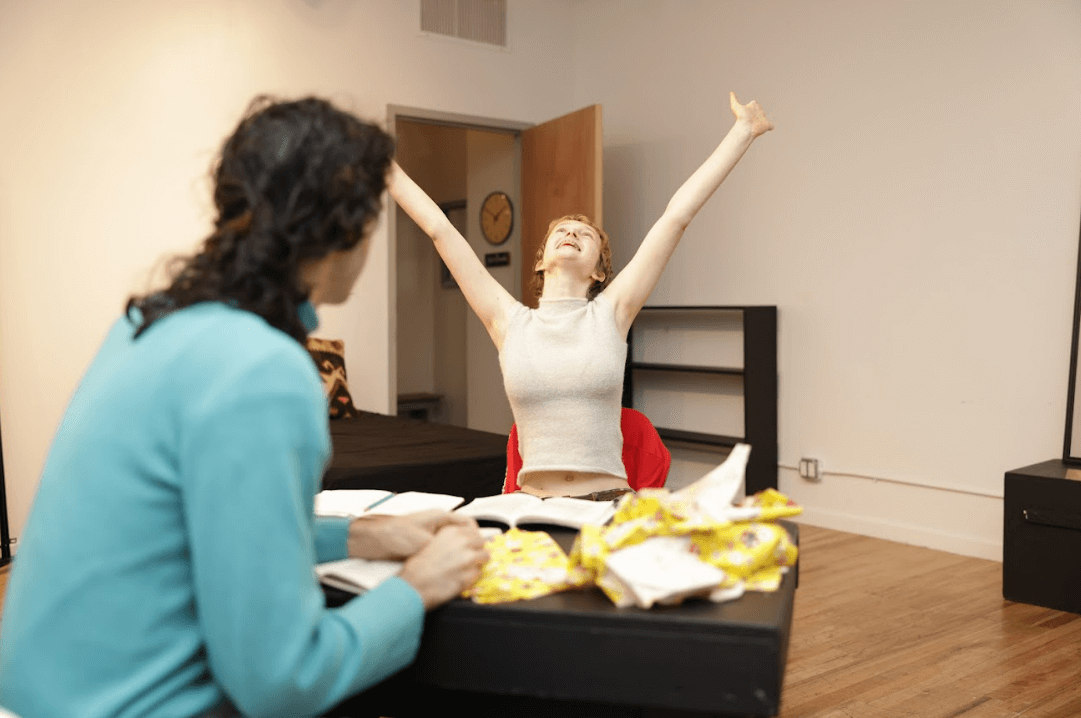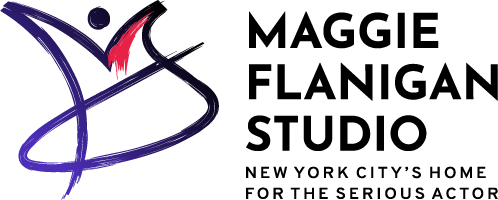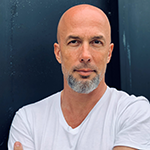APPLY FOR ADMISSION
FIRST YEAR MEISNER ACTING PROGRAM

Begins January 7th, 2025

Call To Schedule an Interview
(917) 794-3878
Meisner Technique Examples: Bringing Truth to Every Scene
The Meisner Technique reshapes how actors bring honesty and emotion to every scene.
Using exercises like repetition, actors stop performing and start living truthfully under imaginary circumstances, responding spontaneously to their scene partner and staying fully present in the moment.
In this blog, we’ll explore some core Meisner Tecnique components that will deepen your emotional connection and transform your acting into something grounded in truth. From the early repetition exercise to emotional preparation, these actor training methods will help you step into any role with confidence and authenticity.

Key Takeaways
- The Meisner Technique focuses on doing truthfully and responding personally in every moment with your scene partner.
- Emotional preparation is what an actor does off-stage or off-camera to emotionally relate to a previous circumstance.
- The Maggie Flanigan Studio offers a comprehensive Meisner training program, which empowers actors to fully develop their craft and provide a process for consistently creating authentic human behavior.
How the Meisner Technique Shaped Modern Acting
Developed by Sanford Meisner at York City’s Neighborhood Playhouse in the 1940s, the Meisner Technique reshaped acting by emphasizing necessary fundamentals grounded in truth.
Alongside Harold Clurman and other members of the famed Group Theater, Meisner believed that actors should be doing truthfully in every moment, responding personally to their scene partner, instead of indicating practiced line readings, and fake emotion.
This method encourages actors to fully engage with their fellow actors, actively listening and responding in a way that feels genuine and alive.
Meisner’s teachings have profoundly impacted the craft of acting, influencing many actors like Robert Duvall and Sam Rockwell. His technique, grounded in a seemingly simple, repetition exercise also covers emotional preparation, and the importance of crafting. This helps actors get out of their heads, onto their spontaneous impulses, and fully present in every moment.
The Repetition Exercise: Creating Genuine Connection
The beginning repetition exercise starts with two actors facing each other, about 8ft apart.
One makes a subjective observation about the other person—for example, “You look like a poet.” The other actor repeats this phrase back responsively, and the repetition continues.
There are organic ways of changing the repetition, which gets introduced in the first 4 to 5 classes. The key is to treat the contact as a reality, hold onto the continuity of the repetition, take in, and respond personally in every moment.
Over time, the repetition is removed, and students are solely responding in the moment for how they feel, given what is being said to them and how.
The Meisner repetition is the beginning seed of what is ultimately a profound improvisational exercise. The training gets the actor out of their head, their attention on the other person, fully in the moment, and listening with vulnerability and empathy.
Emotional Preparation: Tapping Into Real Feelings
In the Meisner Acting Technique, emotional preparation is rooted in the imagination, and the actor’s ability to daydream and fantasize. This is a major departure from the work of Lee Strasberg and his Method, which teaches actors to use their own literal life experiences, their traumas and tragedies, in order to manipulate themselves emotionally.
Emotional preparation is what an actor does off-stage or off-camera in order to emotionally relate to a previous circumstance. It is self-induced emotion, and it is a core fundamental of the acting process.
If you want to play complicated characters in high stakes scenes, you will need to be able to do this. Meisner training teaches you to confront the circumstance, boil it down to its emotional essence, and find a daydream that will connect you deeply to it.
This allows actors to enter a scene emotionally alive yet able to be played upon and changed by the other actors in the scene. Emotional preparation gets you connected, and then you put your attention on the other person, and go from unanticipated moment to unanticipated moment, with ease and emotional fluidity. This is the mark of a really good actor.
Independent Activity: Finding Authenticity in Every Moment
The independent activity in Meisner training challenges students to truthfully do a task while also staying emotionally engaged with their scene partner.
The independent activity was created by Meisner to teach the actor how to craft. It is a core piece of Meisner repetition exercise. You will never be better than your crafting as an actor.
In this work, students learn how to craft simply, specifically, and personally. The first year of Meisner training focuses on the previous circumstance, the acting relationship, and the shared circumstance and issues between you. These are fundamental questions that need to be pinned down when working on a script.
The Pinch and the Ouch: Reacting to Emotional Cues
The pinch and the ouch is a core fundamental of acting, and it rests on a simple principle; I don’t do anything unless the other person makes me do it.
Most untrained actors push, strain, and often simply act at the other person. This is what the hack actor does. When this principle is violated, the reality of the scene is no good. You want your ouch to be in direct proportion to the pinch. This is cause & effect, and it is ultimately something that needs to be second nature in an actor.
Meisner understood that a truthful reality depended on each actor being in continual adjustment to the other actors in the scene. If someone tickles you with a feather, don’t smack them with a baseball bat.
This principle really challenges the student to leave themselves alone, go with the truth of the moment, and give up trying to make anything happen. This seems simple, but not easy to do.
This is one of the core fundamentals of acting that the Meisner Technique teaches you in the first year of acting training.
Improvisation and Spontaneity in Meisner Training
Sanford Meisner valued spontaneity and authentic reactions in actors, and it is a point of emphasis in his acting technique.
In Meisner training, actors use a continuous, structured improvisation during the first year, so that each moment is unanticipated, spontaneous, and personal.
Rather than relying on pre-planned responses, students respond instinctively to their scene partner, attentive to how they are being spoken to and treated. The ability of an actor to be malleable to the nuances of another person’s behavior is a mark of their skill, training, and innate talent..
This actor training method helps actors stay present and adaptive to the imaginary circumstances, and relationships they encounter in a script. It produces performances that feel real and alive, driven by instinct rather than rehearsed choices.
For Meisner, good acting comes from doing truthfully, listening with vulnerability, fully present, going from unanticipated moment to unanticipated moment.
Why the Meisner Technique is Essential for Actors
Meisner’s Acting Technique is vital for every actor who strives to bring raw, emotional truth, and vivid human behavior to their performance. Here are the key benefits that make this technique invaluable for any actor:
- Instinctive reactions: The technique trains actors to trust their instincts by responding personally in every moment. This starts with an actor’s placement of concentration. The goal is to get it off of yourself and onto the other person. This is the first step in freeing your instrument.
- Deep emotional connection: The Meisner Technique teaches you how to come to a rich and authentic emotional life in three different ways. You learn how to come to life by working off another person and taking each moment personally, crafting well and truthfully doing, and emotional preparation, which is off-stage, self induced emotion. These are also core fundamentals, and a focus of the first year.
- Authentic spontaneity: Spontaneity is possible if the actor is out of their head, and can act before they think. This is challenging, because in life we are taught the opposite, think before you speak, choose your words wisely, etc. It is in your sponteneity, that your authenticity can come to the surface. It is an essential fundamental of a well-trained actor.
- Simple, specific, and personal crafting: You’ll never be better than your crafting, and it is an essential part of an actor’s skill. The first year of Meisner training will teach you how to craft a previous circumstance, an acting relationship, and shared circumstances. These are the initial, basic questions that must be pinned down when you are working on a script.
- Concentrated, empathic listening: Listening is the bedrock of acting, and is the core of the Meisner Technique. Most actors don’t listen, they wait for their cues. Listening is what can change you in an instant, it is what will keep you fresh, vital, and truthful from take to take, and performance to performance. If you can’t listen, you aren’t an actor.
- Adaptability: A Meisner actor can be played upon and changed by another human being. This requires adaptability and a willingness to go the way the moments take you. Many actors get locked into choices they make, and end up doing those at the other person at the expense of the truth of the moment. Great actors prize the truth, and adapt continually.
Why Maggie Flanigan Studio is the Top Choice for Meisner Training
The Maggie Flanigan Studio doesn’t just teach acting—we develop artists. Our commitment to training serious actors who have the ability to create organic, vivid, fully realized human behavior is what our reputation has been built on for over two decades.
With a curriculum that dives deep into the full two-year progression of the Meisner Technique, we push actors to explore their emotional depths through Meisner’s first year repetition exercise, which includes the independent activity and emotional preparation.
Under the guidance of master teacher Charlie Sandlan, our two-year conservatory delivers hands-on, MFA-level acting training designed to unlock your full potential as an actor. Our studio is a space where actors grow, both in their craft and as individuals. We believe in fostering a tight-knit, supportive community where you can explore your talent freely.
Beyond the core Meisner work, we offer conservatory courses in Voice & Speech, Movement, and other critical disciplines that round out your training, giving you every tool you need to succeed in the professional world.
Take the next step in your acting journey—call Maggie Flanigan Studio today to learn more about our Meisner training program.
Summary
The Meisner Technique is considered one of the greatest ways to train a professional actor. It is rooted in the understanding that acting is the ability to do truthfully under an imaginary circumstance.
Rooted in the teachings of Sanford Meisner, this approach to acting challenges you to develop a truthful acting instrument, where all of the fundamentals are in place.
The Meisner Technique will teach you how to listen, how to get the attention off of yourself, get out of your head, onto your spontaneous impulses, responding personally from unanticipated moment to unanticipated moment. You will learn how to break down a script in a simple, specific, and personal way.
The Maggie Flanigan Studio believes that Meisner training is all about discovering what it means to be an artist, an actor who has a deep understanding of the art form, grounded in technique, and rooted in the deep discovery of the human condition.
Frequently Asked Questions
How does the Meisner technique work?
The Meisner Technique works by training actors in the fundamentals of acting. Through Meisner’s repetition exercise and emotional preparation, Meisner-trained actors learn to stay present in the moment and connect with their character on a deeper level.
What is an example of a Meisner repetition exercise?
A classic Meisner repetition exercise begins with two actors facing each other. One actor makes a subjective observation—such as “You look like a poet”—and the other repeats the phrase back, from a personal point of view.
The repetition continues, as each student learns to get the attention off of themselves, onto the other, responding spontaneously and personally in every moment.
Is Meisner a good acting technique?
Yes, the Meisner Technique is widely regarded as an excellent approach to acting training. This technique is taught at NYC acting studios like the Maggie Flanigan Studio and is valued by actors for its focus on emotional authenticity and deep character connection.
What is the Meisner script analysis?
Meisner script analysis involves breaking down a script with a focus on the emotional truth and behavior of the character rather than intellectualizing the text.
Meisner training teaches you how to answer fundamental questions like what is the previous circumstance, the acting relationship, and the shared circumstances and issues in the scene. The second year of training focuses on an actor’s ability to implant meaning, justify text, create impulses, and do actions.
How do you step into the shoes of another human being and catch the character’s emotional line of the scene? This is the important script analysis work that separates the hack actor from the serious artist.
What is the difference between Meisner and the Method?
The Meisner Technique emphasizes the imagination. Lee Strasberg’s Method approach to acting involves using your literal past, your traumas, tragedies, and triumphs, to manipulate yourself emotionally.
Meisner believed that this was unnecessary and sometimes unhealthy. The imagination is a far more fertile and creative place to work. Your imagination is the most important part of your creative instrument.
Additionally, Meisner’s belief in drilling the most basic fundamentals, produces an actor that is grounded in truth, spontaneous, and incredibly vivid.
Recent Post
STUDENT TESTIMONIALS
“I was placed in the intense reigns of Charlie Sandlan. I became a better artist, actor, friend, sibling and daughter because of the studio. Even now, I crave the studio every day. What I learned is present in my work every day. I truly believe in everything they stand for.”

“Maggie taught me that I could control my work, my acting, and to throw all of the bullshit out that I had in my head about ‘what I should be doing’ and to just listen and respond honestly, in the moment. She gave me a craft. She is, quite simply put, THE BEST.”

“Maggie Flanigan taught me the true meaning of artistry, passion, and professionalism. I am certain that I continue to work as an actress because of my training with Maggie. At every audition and every performance, her guiding voice is with me. It is a gift beyond measure.”

“Maggie Flanigan is uncompromising, her instincts as a teacher are razor sharp. She doesn’t miss a beat”

“Maggie Flanigan has been one of the most important people in my artistic life. I want to work with Maggie trained actors. As an actor myself, she is my first source. I do not say this lightly, if you are serious about acting, and willing to work very hard, then go to Maggie.”

“Maggie helped me find my sense of truth, an actors greatest asset. Maggie is an expert at instilling that vital ingredient, which allows an actor’s potential to become limitless. My work will forever be rooted in the clarity and honesty she helped me develop.”

“After working for ten years, I did the 2 year program, and now feel that I have the tools I need to become the actor I’ve always dreamed of being. Maggie Flanigan instilled in me a clear sense of truth and a standard of perfection. I am a better actor because of this studio.”

“As an actor, the core of what you have to rely on is your sense of truth and humanity. Maggie allowed me to discover and embrace mine. Trusting my sense of humanity and truth has given me the ability to take risks in my work and my career decisions.”

“Maggie Flanigan has the unique ability to get an actor to the essence of what is true in a moment. She creates a safe and caring environment in which to work.”

“Maggie Flanigan introduced me to my own spirit and my own sense of Truth. Her passion for teaching and ability to communicate are rare gifts to any actor looking for a technique to set his or her talent free. Maggie’s voice has been the one constant guide in my career.”




